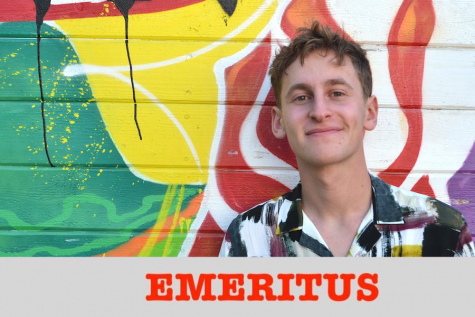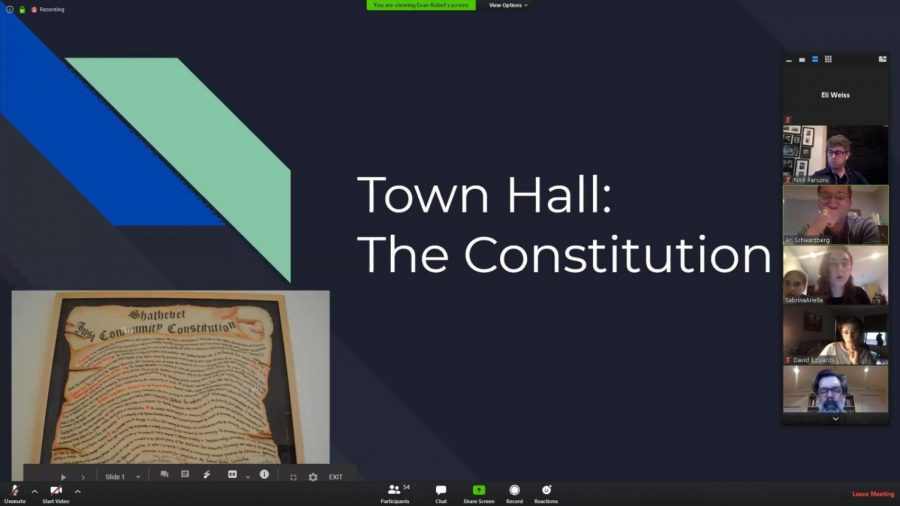Zoom Town Hall will debate proposed new constitution tonight
Proposed document would add new committees and administration approval for Town Hall topics
LIVE: A Zoom meeting this evening is considering a new constitution, proposed by seniors David Edwards, Sabrina Jahan and Evan Rubel.
The Just Community tonight will hear a proposed replacement of the 2002 constitution with a new, longer document which aims to add more oversight to the legislative process and be adopted before school ends in June.
In a virtual constitutional convention beginning at 7:15, the community will get an opportunity to go through the document and ask clarifying questions and propose amendments. There will be “flash-votes” after reading sections to determine those sections’ popularity.
According to Sabrina Jahan, one of the leaders of the constitutional convention, an actual vote on the entire document will happen at another date.
“We’re going to give this as much time as it needs,” said Sabrina. “It really depends on how the Town Hall tomorrow goes. If people really seem to like what’s happening… then we might be able to vote as early as Friday… But if people bring things up that demonstrate to us that there’s still more work to be done, we’re not going to rush this process. We’ve been working on this for a year so we want to do it right.”
The proposed constitution has several goals, but mostly aims to better reflect the state of the current school as it is today, which is not in line with the school’s original 2003 constitution in several respects, including not having committees which were outlined in the constitution and having a different legislative process than is laid out.
It adds more than 1,400 words to the original document: the current constitution is 2,305 words, while the proposed constitution has 3,704.
In addition to adding minor wording to most sections, the new document creates a new subcommittee of Fairness called the Judicial Review Subcommittee, which is aimed at adding administration review of proposals. It also adds new mini-committees called councils, and attaches the Student Activities Committee officially as a part of the Just Community.
The process of creating the new constitution has been led by Agenda Chair David Edwards, Fairness Co-Chair Evan Rubel, and Sabrina Jahan, a senior who’s taken an interest in the issue. The group held several private meetings about the constitution last spring and over the summer, including at least two with school founder Dr. Jerry Friedman and other Just Community leaders and administration. Boiling Point representatives also were present. Over this period the three created a revised constitution.
Sabrina, Evan and David also hosted two “constitutional conventions”— open meetings where Just Community members could debate ideas they were considering — on Nov. 20 and Dec. 18. They said they planned to have more of these meetings but did not, instead meeting privately over Zoom to finalize the document.
Last Thursday, David announced on Schoology that the new proposal would be brought to the community tonight.
“We would really like to emphasize the fact that, in order to have a productive conversation during our hour-long Town Hall, we ask that you take the time to read the draft if possible,” David wrote. “There are some complicated – but, in our opinion, incredible – sections that should be deliberated, and we encourage and want your input.”
He also posted the document online in Google docs, and invited students to ask questions about it as comments. Comments were submitted by several members of the Boiling Point staff, but no one else.
Tonight’s meeting will be focused only on going over the draft, the three seniors said. And though all seniors are finished with school after this Friday, May 8, they said last night that they would still lead discussions and votes until the end of the school year if necessary.
To help readers better understand the document you will be discussing tonight and eventually voting on, here are the most important changes to the constitution, explained:
Judicial Review Committee
The biggest change in the revised document is a greatly expanded role of the Fairness committee in the legislative process, achieved mainly through the creation of a new “Judicial Review subcommittee.” The subcommittee would be comprised of the head of school, the Fairness chairs and the Fairness faculty adviser.
Proposal Review
Under the proposed subcommittee of Fairness, all proposals would have to pass through this subcommittee before they are brought to Town Hall. This is in response to the administration vetoing proposals in the past even if they were passed by student vote.
Having the subcommittee would add another step before a proposal is brought to Town Hall and could mean some proposals are not heard, but would ensure all Town Hall votes binding. The subcommittee is composed of the Head-of-School, Fairness faculty adviser and fairness chairs.
The subcommittee is tasked with determining if the proposal violates the constitution. They can veto a proposal if it ventures into the “realms” of law, curriculum, Halakha and local, state, and federal law- these restrictions have been part of the Just Community since its inception.
The new proposal allows the committee to also veto proposals based on if the committee believes the proposal violates “the values of the Just Community” and if the proposal is not in line with the school’s hashkafa— or individual religious holdings which are not in the realm of Halacha.
While the “values of the Just Community” are not defined in the constitution, Article I section 4 states that “every two years, beginning with the third quarter of the 2019-2020 school year, the Agenda Committee — in order to properly promote the values of the Just Community — must prepare and execute at least one Town Hall meeting to discuss the values of the Just Community and their continued relevance.” This is aimed at ensuring that the new constitution does not become irrelevant to the student body like the current one is.
One concern is that all JRS decisions must be made by unanimous vote. If a member of the subcommittee holds out on a vote and thus in effect prevents the proposal from going to Town Hall, the constitution states that after 10 days the subcommittee must bring their debate to a public forum and state their opinion in front of the school. It is possible for there to be no resolution to a JRS vote.
The JRS also has the responsibility to write summaries “of the arguments and rationales used to come to their decision, along with specific citations from the Constitution to support their verdict,” which is aimed to make the committee more transparent and ensure their reasoning is sound.
Legislative petition
The new constitution would introduce a new process called the “legislative petition” to be overseen by the Fairness Committee.
Article II Section 3 states that anyone can “bring pending or passed proposals, administrational policies, and constitutional statutes… to the attention of the Fairness Committee through the submission of a legislative petition.”
If the Judicial Review Subcommittee unanimously approves the petition, they then send it to the Agenda Committee to be debated at Town Hall.
If there are no “constitutional concerns,” accepted petitions would sent straight to Agenda to make necessary changes in the handbook or constitution.
If there are constitutional concerns, Fairness can forward them to the Judicial Review Subcommittee “with explicit reasoning as to why the forward is necessary.”
If the Judicial Review Subcommittee unanimously approves the petition, they then send it to the Agenda Committee to make necessary changes in the Student Handbook or constitution.
Town Hall
The proposal contains a major wording change from the original constitution’s description of Town Hall. The original document approved in 2002 said Town Hall was where “proposals for the addition or adaptation of rules, procedures and policies shall be processed and executed.”
The new document removes that wording, replacing it with a much more ambiguous description of Town Hall.
“Town Hall meetings shall, specifically, consist of what the Agenda Committee sees as best for each meeting. These meetings should happen on a regular basis. The Agenda Chair, or their designee, shall lead Town Hall.
“Town Hall is also a space to facilitate the proposal process as detailed in Article I, Section 3.”
This change reflects what Town Halls have looked like for the past several years — almost entirely made up of “moral dilemma” debates rather than proposal debates. The new draft does not say that every Town Hall must be a moral dilemma, but it allows for them, or other potential Town Hall topics, to exist at the discretion of Agenda, where the current constitution does not.
Elections
The proposed new constitution codifies a decision made last year that Fairness will be in charge of holding Just Community elections for the Fairness, Agenda and Student Activities committees. This job was previously assigned to the Agenda Committee.
Composed of the chairs and faculty adviser of the Fairness Committee, the new “Elections subcommittee” is assigned in the proposed preamble with overseeing “all Just Community elections with logistical administrational cooperation from the administration.”
Councils
The proposed constitution adds the concept of “councils” which will serve as less official versions of committees that function within a “council charter” to regulate a particular area of school life.
The charter must be passed as a proposal and can determine matters such as how members join the committee and the scope that the committee can function under. Charters must be taken to the JRS like any other proposal.
Responding to a BP question on the public document, Evan described possible councils.
“We envision the continuance of the Chesed Committee but as the Chesed Council, due to its nature and scope as a group of appointed members of the Just Community who have a focused goal in improving chesed,” said Evan. “Some other ideas for potential Councils include the Dress Code Council, a governing and advocative body dedicated to a continued student-administration partnership regarding dress code. The Dress Code Council could suggest proposals for dress code, plan and facilitate community forums to discuss issues pertaining to dress code, amongst other things.”
The draft says that one can at maximum serve on two councils or be a representative on a committee and be on one council.
SAC and CCC
The new draft adds the Student Activities Committee (SAC) — which runs morale-boosting events and plans color war and has existed at least before the last constitution was written — to the constitution and outlines a process for their committee to run. But it leaves SAC more leeway than the Agenda and Fairness committees.
Gone is the defunct Constructive Consequences Committee (CCC), which is described in the constitution as being responsible to “assign just and constructive punishments to members of the community who act in violation of the Rights clause of the Constitution.” In the old constitution, the CCC is supposed to assign punishments to violators of the constitution while the Fairness committee settles disputes between Just Community members. As of recent years, the Fairness committee has served both of these roles.

Jacob Joseph Lefkowitz Brooks was editor-in-chief during the 2019-20 school year and is now a student at the University of Toronto.








